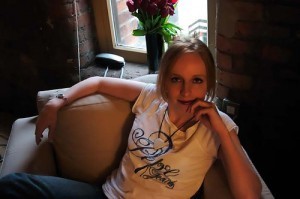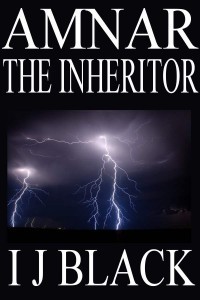Renegade A to Z – J is for…

Joely Black
… Joely Black, author of the Amnar series, and the person who inspired me to start podcasting 20 Years Later all that time ago. Joely was one of the first people who I really conversed with on Twitter, and has been a source of inspiration to me as a writer who just gets on with writing and putting it out there, which is ultimately what we authors have to do.
I asked Joely some questions so you can get to know her too. If you're on Twitter, go and find her (she's called @TheCharmQuark) and you can find her blog on her site here.
Why do you write?
Joely: It's never really occurred to me not to write, to be honest. I've met a lot of people who'll say "I've always wanted to be a writer" and I wonder what stops them actually writing. I began when I was very young, like you did (I have the same story of being very young and putting together books for relatives), and I see it as being a bit like breathing. There's stuff in my head to be written, so I write it.
What do you love most about writing?
Joely: I enjoy being with the people, watching their stories play out. I do get a massive thrill out of getting through some scenes, especially if I've been planning them for ages, or something big and dramatic happens. Then there's the joy of being able to create a whole world, and when you get a piece that fits perfectly, and ties everything together.
What do you hate most about writing?
Joely: The worst bit for me has been the conversations, when you're introduced to somebody by a friend as a writer and they say "Are you published?" and when I have to say that I'm not, they give me that "You're not for real" look. It's been hard struggling against the feeling that I'm getting nowhere with something that is very precious to me, and wondering if I'm insane for doing it.

Amnar: The Inheritor
Can you give an introduction to Amnar for people new to it?
Joely: Amnar is a huge fictional world, not earth but very much like it, in the sense that the people struggle with the same personal issues that we do. It's a civilisation dealing with a massive problem: it's peaceful, and now it has a despotic dictator destroying one of its biggest states, and doesn't know how to handle it.
There's a mixture of personal and political, private and public drama. There are a lot of people's stories in there. I think of it as being a cross between the complexity of China Mieville, the spirituality and theories of consciousness of Philip Pullman and the sociological perspectives of Ursula le Guin. I guess in terms of the way the civilisation is structured, people should expect something a bit like a fantasy version of Iain M Banks' Culture novels.
What first inspired you to start writing Amnar?
Joely: About 13 years ago now, I was completing my undergraduate dissertation, and a set of different stories about various worlds coalesced into one, centered around the character Io. She was always a young woman, androgynous, and feeling that she didn't particularly fit in anywhere. I wrote the first version of the story back then, and then began really developing the world. Since then, it's really been the only thing that I've felt inspired to write. It feels as though I was given it and told "This is what you work on now."
Can you tell me about your experiences with self-publishing?
Joely: It's been a weird ride. I assumed (as I've said elsewhere), that no publisher would be interested in Amnar. I break a lot of rules, and it doesn't seem to be an easy sale (female lead, fantasy without a lot of the "traditional" fantasy elements). So I put it up on a blog and just said "Here it is." I thought all my readers would say "This is rubbish, go back to academia." But they didn't. Eventually, it reached a point where people were asking for the stories as books, so I decided to put them out there.
I'd grown up with this dream of being a published author and put it to death, as much as I could, because it just looked impossible. I still don't know if I'll get anywhere with it, to be honest. I have a core of people who follow the stories on my websites and will get whatever I put out straight away, but it isn't easy taking this route. I still feel like I'm a bit of a fraud for even calling myself a writer at this stage but for those people who like Amnar, I just keep putting it out there.
What are your future plans regarding Amnar?
Joely: I have given up on making plans at this point. I used to make plans and then life would come along and laugh at me for it. Right now, I'm just writing and writing, because that's what I love doing most, and when I've got a book ready, I put it out there. The thing about Amnar is that it's a huge world, built on the ruins of an even older civilisation. The complexity and depth mean that I could probably keep producing new material based there for the rest of my life.
What is your dream as a writer?
Joely: I've always wanted to be a published author, and support myself from my writing. Amnar has potential as a game or movie, but for me, it's still about the books at the core.
Which writer do you admire the most and why?
Joely: There are so many, it's difficult to pick one. I grew up reading a lot of Eastern European and Russian literature, and Emile Zola, writers who went for really challenging, dangerous subjects and ideas. At the moment, I'm fascinated by Yevgeny Zamyatin. He lived through the Communist revolution in Russia, was a dedicated supporter who used his writing skills to express his doubts about the system in "We", but his book was banned. It was written back in 1929 It took until 1989 for it to gain any real recognition in his homeland. It's a weird read – Zamyatin is as synaesthetic as I am but uses it in his writing that I'd never dare. The result is an almost hallucinogenic experience, and the ending is devastating. It must have taken incredible courage – beyond that of commentators who wrote from the safety of a democratic state about Communism – to write and publish a book with such a critique of a system he had once so wholeheartedly supported.
If you could be a character in any novel, who would it be and why?
Joely: When I was younger, I really wanted to live in Ursula le Guin's archipelago. I still would. I'm not sure who I'd be (I did love Ged), but that's where I'd be if I couldn't actually go and live in Amnar itself.
Thanks Joely!



